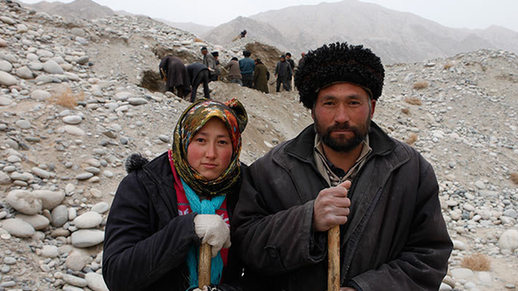Jade miners' dreams of wealth
 0 Comment(s)
0 Comment(s) Print
Print E-mail China.org.cn, December 10, 2014
E-mail China.org.cn, December 10, 2014
 |
|
[Photo/China.org.cn] |
At 7:30 a.m., a 34-seater bus crowded with 120 people, each paying five yuan for a ticket, drove more than one hour to the Almas jade mining area. On the way to the jade mining area in the depths of the Kunlun Mountains, jade miners would stop to pray to Allah for a swift and fruitful journey. The jade prospectors also put down their tools at certain points throughout the day to pray to Allah.
Jade miners usually build semi-underground stone houses to sleep in. Those better-off prospectors tend to clean theirs up or put up thatched huts on the ground. Mamat Kasim Bekri, a 50-year-old jade prospector, has been mining jade with his family members, relatives and neighbors in the area for 15 years. This day was the first day that his 17-year-old eldest daughter, Moha Baiti(whose name means "love" in Uyghur), had come to Almas to join him. Abduweli Aimar and Abdullah Tursun from Moyu County were neighbors in their village. Coming together to search for jade in Almas, they now become roommates.
Every afternoon, one corner of the jade-mining bed will become a place to auction jade. Middlemen who ride in on motorcycles buy rocks from the jade miners and then sell them to jade traders in other towns. More than ten people bid in the auction for a 135-gram piece of jade up for sale in the auction market. When the seller agrees to a final price, he will shake hands with the buyer to seal the deal. This style of doing business is a characteristic tradition of Hetian jade culture.
There is also a jade bazaar at the Hetian jade market every afternoon. Traders lock their jade into cages until buyers return to claim their purchases. Sellers and buyers here conduct their transactions without saying a word to each other. They confirm an agreed-upon price with only a handshake. Once the transaction is confirmed, buyers pay cash as soon as they have the jade in hand. There was no shortage of businessmen buying these materials at the time these photos were taken, but the price of jade was several times higher then.
In March 2011, the Hetian municipal government adopted a policy strictly forbidding the use of excavators to extract jade. Since it went into effect in May of that year, scenes of large-scale industrialized mining have no longer occurred there.
Today, those lucky dogs who are blessed by Allah with lucrative hauls of jade are relatively rare, and the miners also know that prices they get from middlemen for the jade they dig up are tens of times – maybe even hundreds of times – less than the prices the middlemen ultimately sell the jade for. But even given these tough conditions, many jade miners refuse to give up. They don't want to let even the slightest opportunity to get rich through the work of their own two hands slip away until the last piece of jade is extracted there.





Go to Forum >>0 Comment(s)